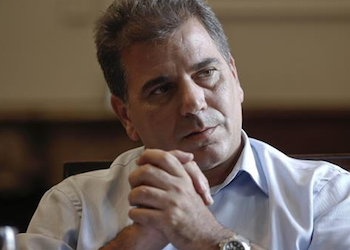The security minister of Buenos Aires province has indicated that authorities plan to continue an ongoing effort to reform the provincial police, a campaign that has already uncovered widespread corruption in the force.
Buenos Aires Security Minister Cristian Ritondo told La Nación in a February 2 interview that some 3,300 officers were dismissed last year, and that 200 of those officers were sent to prison on various corruption charges.
According to the news outlet, Ritondo repeated “again and again” that if authorities found “something strange” about any officer, that person would be removed from the force.
The reform of the Buenos Aires provincial police was first outlined in a January 2016 emergency security measure approved by congress. In March 2016, provincial Gov. María Eugenia Vidal allocated 6 billion Argentine pesos (more than $380 million) to the effort.
The Buenos Aires Herald has reported that the reform initiative includes a “thinning down of the number of top police officers, the obligation that the brass submit asset statements that have been reviewed by civilian auditors in Internal Affairs, extended training for cadets and the creation of a criminal intelligence unit.”
When asked by La Nación if the Security Ministry is conducting a “purge” of the police, Ritondo responded by saying, “I don’t like that term. What we are doing is sanctioning bad police.”
Ritondo also lamented a recent court decision that allowed eight provincial police officials accused of corruption to remain out of prison.
“It took me by surprise,” he said. “It wasn’t pleasant to see how they were let go.”
The Buenos Aires provincial police, known locally as the “bonaerense,” have long had a reputation for both corruption as well as brutality. For years, the force has been referred to as a “mafia,” and its officers have been accused of carrying out extrajudicial killings as well as cooperating with criminal organizations.
InSight Crime Analysis
Although the removal of several thousand officers from the bonaerense can be seen as a positive step toward addressing corruption in the force, it is also an indication of the large scale of the problem. According to the Buenos Aires Herald, the force is the largest in the country with roughly 90,000 officers. The 3,300 removed last year constitute more than 3 percent of the total.
SEE ALSO: Coverage of Police Reform
In addition to removing corrupt officers and sanctioning misbehavior, the reform initiative also aims to address institutional and management problems as well as shortages of important equipment like bulletproof vests and encrypted communication devices.
The success of these efforts (or the lackthereof) will likely have implications for the security situation in Buenos Aires province, which has recently seen an increase in violence related to organized crime and the drug trade. Addressing corruption and inefficiency in the provincial police force is an important step toward reversing those trends.

